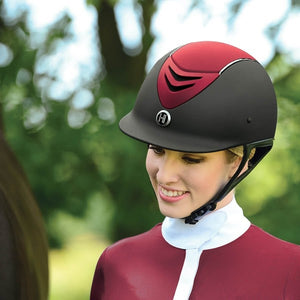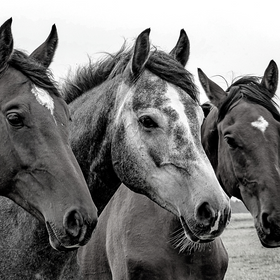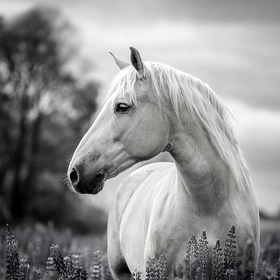
Battle Of The Barn: Fighting Flies
Whether the calendar says it or not, summer is officially here. And so are the flies. Flies are not only a nuisance to your horse, but they can pose a health problem if proper precautions are not taken in and around your barn. It’s time to arm yourself with the right army to keep your horse calm and healthy all summer long.
What’s So Bad about Bugs?
You might think that flies are just annoying pests hovering around your horse, but flies can cause some health concerns that you should be prepared for.
One example is equine dermatitis. While equine dermatitis (or sweet itch) has a variety of causes, the leading cause is from fly or midge bites. These bites tend to be found more on the horse’s face and ears and can cause an allergic skin reaction.
Other diseases horse owners might not be aware of include pigeon fever, equine infectious anemia and summer sores. These are all introduced via biting flies and gnats. Without the proper protection, your horse can come in from the field with bites, welts and some sort of reaction to pests, leaving him uncomfortable and possibly in a foul mood.

Here are five tips to help you manage these pests around your horse and barn.
Tip #1 – Around the Barn
The first battle in the war against flies is to keep a clean barn area. Consider the location of your manure pile—is it close to the barn or arena? If so, that can increase the amount of flies and insects your horse has to fight.
Consider removing manure from your property completely. In some areas, waste management companies will provide dumpsters for a fee to haul off manure. While this is ideal, it might not be feasible for everyone. If you have enough property consider spreading the manure on your pasture. However, this can potentially spread parasites to other horses. Be sure to check with your local agriculture agent for best practices in your area.
Also remove any areas of standing water, such as water stores around the barn, stagnant buckets, etc. This will also help in battling disease-carrying mosquitoes.
Keep in mind the type of grain you feed, and whether you leave it out in the open prior to feeding time. Sweet feeds attract flies because of the molasses used. Any surface that comes in contact with sweet feed (i.e., feed pans, feed scoops, etc.) will be a harbor for flies. Using pelleted feeds can be one easy advantage to your fly control problem, as well as proper storage of any supplements that might attract pests.
Keep the barn aisles clean and remove any collected garbage from the barn regularly to prevent any pests from making more of a mess. Regularly clean your water buckets and feed pans, which will additionally entice your horse to drink more water when they need it most.

Tip #2 – Night Time is the Right Time
Black flies are active during the day, so you’ll find that many farms will keep their horses indoors during the day, under fans, and then turn them out at night when they're not only cooler but also more relaxed without the concern of bugs.
Experts say most biting insects are not good flyers, so offering constant airflow in the barn will not only keep your horses cool in the heat of the summer but deter flies from landing and biting on your horses. Make sure your fans are designed for use in barns or outside environments. You’ll want your fans to have fully enclosed motors, sealed bearings, and a thermostatic shutoff switch in case the fan overheats.
Tip #3 – Spray Away
One of the most popular tools in the fly fighting arsenal is fly spray, such as the Pharmaka Clac Fly Repellent. Varying fly sprays can be found at any tack and feed store, but it can be very confusing as to what’s the best option for your horse. Most horse owners are looking to get more bang for their buck, thus using a fly spray that has a formulation that claims that it can kill a broad spectrum of fly species.
Offinialis’s DER Spray is one of the few fly spray products that not only protect your horse from flies, but also helps treat sweet itch and condition the horse’s coat. It is an all-natural product with a combination of lavender water, geranium essential oil and neem essential oils. The use of neem oil has been used as a bio-pesticide for organic farming, repelling a wide variety of pests. The all-natural combination means not only an effective organic defense for your horse, but its pleasant smelling for humans, too.
Tip #4 – Repel Them
Some of the smells we find pleasant repels flies and other insects. Repellent products for the barn, such as BugPellent Safe Continuous Pest Control, help keep adult flies away, which will also limit their options to reproduce near the barn. The BugPellent system contains natural essential oils and organic waxes. These can replace the whole barn spray systems that can expose people and animals to toxic chemicals.
Tip #5 – More Than a Fashion Statement
More and more horse owners are choosing to use fly repellent apparel such as fly masks and fly sheets to protect and offer comfort to their horses while they enjoy the outdoors, without worrying about the effects wearing off.
Fly sheets such as the Centaur Super Fly Plus Sheet and the Pessoa Coolwave Combo Fly Sheet are lightweight, breathable, and offer protection from just in front of the withers to behind the tail. The polyester SoftMesh allows for your horse to stay cool and protect him from the sun on even the most grueling of summer days. Pair it nicely with the Centaur Super Fly Plus Neck Cover, which allows for cover from the pole to the withers.
The most basic of protection should include a fly mask. Options such as the Pessoa Coolwave Combo Fly Mask and the Centaur Super Fly Long Nose Mask protect not only the eyes but cover the ears and stretch over the nose for all-over protection of your horse’s head. These masks are made of strong polyester rip-stop mesh that is durable, yet breathable and provides protection from the sun’s harmful ultraviolet rays.
Using products such as fly sheets and fly masks allow for longer periods of fly protection, with no threat to horses with sensitive skin that might not do well to sprays.
Keep Them Protected
Whatever you choose, discuss with your veterinarian and farm manager the best route to take when protecting your horses from biting insects. Taking the time to outfit your horses in fly repellent gear and applying a fly repellent can keep them comfortable and healthy, thus providing you with a much better ride.





